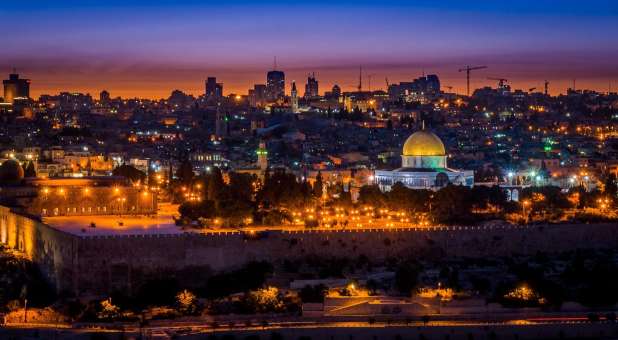As the seventh feast of the seventh month of the biblical calendar, the Feast of Tabernacles (Sukkot) points toward the culmination of God’s redemptive program. Each year, as we read in Leviticus 23:39-43, we celebrate this harvest festival to rejoice in His sufficiency. We wave the lulav branches (Lev. 23:40) to the four corners of the earth, acknowledging God’s provision for us and His sovereignty as the King of Kings who reigns over all.
Another important aspect of this yearly festival celebration takes place as we build our three-sided tabernacles (booths, or Sukkot) from these same branches in recognition of His secure protection over us. These flimsy sukkahs testify that, like the Israelites in the wilderness, we know our safety and stability comes from His ongoing care for us. Like David in Psalm 140:7, we declare that God is the One who is our sukkah (covering) in the day of battle.
Rejoice—The Best Is Yet to Come!
As meaningful and joyous as this annual celebration is for us, the best is yet to come, for the Feast of Tabernacles points to more than merely our present provision and protection. Zechariah foretells that during Yeshua’s reign in the Millennial Kingdom, the Feast of Tabernacles will be an annual celebration in which all nations will gather to testify that the LORD Himself is the source of all the bountiful blessings we enjoy.
A New Orientation
“Then it will be that all the nations who have come against Jerusalem and survived will go up each year to worship the King, the Lord of Hosts, and to celebrate the Feast of Tabernacles” (Zech. 14:16, MEV).
God’s Word reveals that the nations will one day gather to fight against Jerusalem (Zech. 12:1-14; Joel 3:1-2; Ezek. 38:4). It also tells us without a shadow of a doubt who will win this battle, for the LORD Himself will fight for His people (Zech. 14:3)!
Following the battle, the survivors from these attacking nations will once again go up to Jerusalem—not to make war, but to worship the LORD of Hosts, demonstrating their submission to the King of kings. As prophesied in Isaiah 2:2-3, “In the last days the mountain of the Lord‘s house shall be established on the top of the mountains, and shall be exalted above the hills, and all nations shall flow to it. Many people shall go and say, ‘Come, and let us go up to the mountain of the Lord, to the house of the God of Jacob, and He will teach us of His ways, and we will walk in His paths.’ For out of Zion shall go forth the law, and the word of the Lord from Jerusalem” (MEV).
All the nations will have a new orientation around God’s Will and His Word as they worship Him annually in Jerusalem at the Feast of Tabernacles. Their annual schedule will then be aligned with the LORD’s biblical calendar, as His priorities will be seen in their new confession to worship (Zech. 14:16). Those nations who survive will be, by the same grace that spared them, no longer God’s foes but followers of the King.
Prefigured in the annual harvest festival, the Feast of Tabernacles anticipates the greater harvest of God, when all nations will be yielded to the Messiah, the King of Israel established on His glorious throne in His kingdom’s capital, Jerusalem (Matt. 25:31).
The celebration of the Feast of Tabernacles is the future setting for the true worship of the King of kings. Yes, today we rejoice in Yeshua’s complete provision and protection as He presently reigns over our yielded lives. But also, as it points to a certain future, we find this feast to be a significant testimony that annually honors Yeshua and anticipates His royal return.
As we recognize the centrality of Yeshua in the biblical calendar, we orient our lives around His authority, finding our full sufficiency and security in Him and becoming witnesses to His future Jerusalem-centered reign over all the nations.
What if I Don’t Celebrate the Feast?
The very purpose of the Feast of Tabernacles is to demonstrate that God reigns over all His creation. However, in Zechariah 14:17-19, we see that during Messiah’s future reign, there will continue to be resistance to His rule, for nations will refuse to go up to the Feast to worship the LORD of Hosts. Here, Zechariah clearly states that there will be a punishment for those who make such a choice.
Punishment? Yes, for Zechariah is speaking of the kingdom period, not of heaven. In the Millennial Kingdom there will be both believers and unbelievers living together on Earth. The punishment Zechariah speaks of will be a corrective way to bring the nations back to true worship of the one true God as His eternal love is demonstrated.
During the Feast of Tabernacles each year, we in the body of Messiah need to examine our attitudes. Do we worship Yeshua as the true King in every aspect of our lives? How do we uphold Yeshua’s authority in our relationships, activities and finances?
For those with a heart yielded to Messiah, this celebration is filled with joy in sincere worship of King Messiah, the Lord of Hosts. Let us all honor Him through this Feast of Tabernacles as we rejoice in His eternal love! Come quickly, Lord Yeshua! {eoa}
Dr. Sam Nadler is a Jewish believer in Jesus who has been in Messianic ministry for over 40 years. Sam is the president of Word of Messiah Ministries, which is bringing the Gospel to the Jew first but not to the Jew only, and planting Messianic Congregations in Jewish communities worldwide. To encourage and equip the Body of Messiah in our shared calling, Sam is invited to speak in churches across the country, and has written multiple books on Jewish evangelism, discipleship, and the Feasts of Israel. For more information and resources, to subscribe to Sam’s new podcast, or to invite Sam to speak at your church, visit: wordofmessiah.org.
See an error in this article?
To contact us or to submit an article






















